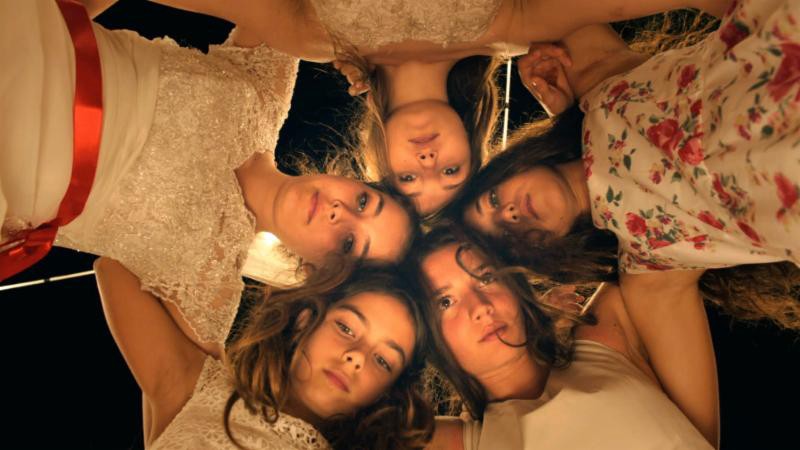Deniz Gamze Ergüven was born in Ankara, Turkey, and studied literature and African history in Johannesburg and directing at La Fémis in Paris. She has directed the shorts “Mon trajet préféré” and “Bir Damla Su.” “Mustang” is her first feature. (Press materials)
“Mustang” will premiere at the 2015 Toronto International Film Festival on September 10.
W&H: Please give us your description of the film playing.
DGE: In a little village by the Black Sea, hundreds of miles away from Istanbul, five sisters trigger a scandal for playing a game where they sit on boys’ shoulders. Their home becomes a [trap] they almost never get out of. And every attempt to achieve freedom results in having literal higher walls around them erected. “Mustang” is the lively, irreverent tale of their attempts to break free.
W&H: What drew you to this story?
DGE: The film grew from my desire to tell what it means to be a girl, a woman, in Turkey today. I had an acute feeling of the permanent sexualization of women there. This starts at an early age, just as it happens to the young characters of the film, who are accused of having “rubbed themselves against the back of some boys’ necks.”
W&H: What was the biggest challenge in making the film?
DGE: There was a lot of drama in the last few weeks before the shooting. The initial producer abandoned ship three weeks before the first day of shooting was scheduled. It was a battle to hold the film together at that point. French producer Charles Gillibert took on the film on very short notice.
From then on, it took us a few weeks to put the film back on track. We were facing one seemingly insurmountable obstacle after another. It was as if the film was passing though fire. Paradoxically, this made us stronger. It became exhilarating to see our capacity to continually bounce back. Ultimately, none of the turmoil around the film is visible on screen. It’s even quite the contrary — there’s something sturdy about “Mustang.”
W&H: What do you want people to think about when they are leaving the theater?
DGE: Through art history and through cinema, we are used to looking at the world through the eyes of men. Femininity is really pioneer land. The ambition of the film is generating empathy with the characters of the film and opening a few doors into this new territory. It was important to me for people to feel with these characters as much as they would think about them.
W&H: What advice do you have for other female directors?
DGE: Making a film transforms your relationship to the world. And there’s some sort of natural authority that builds up along the way. By the time of the shooting, you’re already a veteran. The very fact that you’re holding that whole machine together — the story, the people, the money — speaks to the many fights you’ve won. You’ve come a long way, and most people respect that. And your obsession for the film is what defines you the most, not your gender.
I was pregnant during the shooting of “Mustang,” so that’s about as quintessentially female as you can get. And the only effect even that had on the film was that I got sick in the mornings on the way to the shooting. I very rarely felt that my gender had any bearing on professional relations. Once in a while, I could feel a man challenging my position, but I guess my age could generate that as much as my gender. And at the end of the day, that’s an easy problem to [ignore].
So any advice I could give to female directors would be the same as for males: There will be endless difficulties, some seemingly defeating, on your way. That’s a given. Just wipe out the very notion of stress. Concentrate on your actors. Obsess about your story and the world it is anchored in. Deal with the hundreds of down-to-earth issues [around] the existence of your film. At some point, everything will be ripe. And you wouldn’t be able to stop your film from coming to life even if you wanted to.
W&H: What’s the biggest misconception about you and your work?
DGE: The film and every member of its audience have their own relationship. That’s nothing I can interfere in once the film starts to live its life. But I do get a rash whenever someone defines the five girls as victims in any way at all. They’re figures of courage, perseverance and intelligence — not at all people to be sorry for.
W&H: How did you get your film funded? Share some insights into how you got the film made.
DGE: It’s a European co-production between France, Germany and Turkey. It comprises public, institutional funding from all three countries and through the support of Eurimages. When Charles Gillibert took over the production of the film, Canal+, ZDF-Arte, Ad vitam and Kinology stepped in. Eventually Qatar came on board through the Doha Film Institute at the stage of post-production.
W&H: Name your favorite woman-directed film and why.
DGE: Chantal Akerman’s “The Captive,” which is a very free adaptation of “The Captive,” or “The Prisoner,” by Marcel Proust. The narrative has a wholly subjective logic, composed of sensations, impressions and memories. There are a few of Akerman’s ideas that I often lean on.







